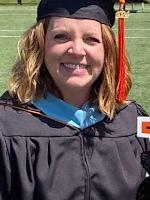

Pedagogy to Practice: Technology Coaching Success Strategies |
Participate and share : Poster
Heather Esposito Jodi Gellman
Learn how a veteran teacher who was a novice with technology became an expert. By focusing on pedagogy, this relationship was grounded in practice, collaboration, and co-teaching. Participants will learn how to nurture relationships and support student voice by selecting strategies and technologies that can be implemented.
| Audience: | Coaches, Teachers, Technology coordinators/facilitators |
| Skill level: | Beginner |
| Attendee devices: | Devices required |
| Attendee device specification: | Laptop: Chromebook, Mac, PC Tablet: Android, iOS, Windows |
| Participant accounts, software and other materials: | Google: Jamboard and Google Slides |
| Topic: | Coaching & mentoring |
| Grade level: | PK-12 |
| ISTE Standards: | For Students: Creative Communicator
Collaborator
Collaborator
|
| Related exhibitors: | Screencastify, SMART, Genially, Canva Education, Book Creator, Wayground |
This session will focus on helping both technology coaches and teachers see the value and learn the process of integrating technology by focusing on instructional strategies, partnering on creation and implementation, and using student feedback as a vital piece of the process. Teachers can be overwhelmed by the variety of technologies available to them, but when an educational coach helps teachers start by focusing on pedagogy and instruction with the areas of growth they would like to support with their students, the task becomes less daunting. We will share our journey and how our relationship grew by showing participants how to move through the process of identifying effective strategies, using supporting student achievement data, working together in co-planning, and implementing technology in partnership with the students. We utilized a planning model that was influenced by the convergence of ideas from the T3 Framework, The Complete Edtech Coach: An Organic Approach to Supporting Digital Learning, and the work of The Quaglia Institute for Student Voice. We will share how these texts, frameworks, and models impacted our approach.
Our lessons evolved around helping students summarize content using the pair/share method embedded in the EduProtocol Template, Sketch and Tell. We also utilized Pear Deck and Lumio (Smart Learning Suite Online) to help the teacher facilitate student progress by giving feedback during lessons and using the tools for formative assessment. We also alleviated time constraints by utilizing technology for assessment, such as Google Forms and Quizizz. Throughout our process, we used student achievement data as well as formal and informal student feedback to ensure the technology integration was both engaging and effective in student learning. What we found was that not only did the involvement of student voice promote successful technology integration, but it prompted students to suggest choice of technology platforms as they continued their work throughout the year, showing that the tools that we utilized promoted relevance as students could imagine their use in other subject areas and settings.
Aguilar, E. (2013). The art of coaching: Effective strategies for school transformation. John Wiley & Sons.
Esposito, H., Fox, K., & Quaglia, R. (2020, May 12). Practical tips to make student voice the cornerstone of your online classes. EducationHQ. Retrieved September 28, 2021, from https://educationhq.com/news/practical-tips-to-make-student-voice-the-cornerstone-of-your-online-classes-76868/.
Fisher, D., Frey, N., Quaglia, R. J., Smith, D., & Lande, L. L. (2017). Engagement by design: Creating learning environments where students thrive. Corwin Press.
Guskey, T. R. (2021, February). Professional learning with staying power. ASCD Educational Leadership. Retrieved September 28, 2021, from https://www.ascd.org/el/articles/professional-learning-with-staying-power.
Hebern, M., & Corippo, J. (2019). Eduprotocol Field Guide. Dave Burgess Consulting, Incorporated.
Juarez, A., & Goyette, K. (2020). The complete edtech coach: An Organic Approach to supporting Digital Learning. Dave Burgess Consulting, Incorporated.
Magana, S. (2019). Disrupting low-impact technology use: Aligning visible learning and the T3 framework for innovation. Thousand Oaks, California: Corwin.
Magaña Sonny. (2017). Disruptive Classroom Technologies A Framework for innovation in Education. Corwin, A SAGE Company.
Miller, M. (2020). Tech like a pirate: Using classroom technology to create an experience and make learning memorable. Dave Burgess Consulting, Incorporated.
Ornstein, A. C., Pajak, E., & Ornstein, S. B. (2015). Contemporary issues in curriculum. Pearson.
Quaglia, R., Fox, K. M., Lande, L. L., & Young, D. (2020). The power of voice in schools: Listening, learning, and leading together. ASCD.

Heather Esposito is the technology coach for all 19 schools in the Cherry Hill School District in Cherry Hill New Jersey. She taught high school English for 20 years in Cherry Hill and is a certified reading specialist. She presented at ISTE 19 on “Screencasting for Improved Fluency with Adolescents," Giving Students Voice and Choice in Technology-Based Literacy Instruction," and Literacy Playground: Innovative Literacy and STEM Learning. She presented at ISTE 20 on "Creating a Community: Screencasting to Support Reading and Social and Emotional Learning" and "From Readers to Leaders: Blending Literacy, Technology and Relationships."

Jodi Gellman is a 4th grade teacher at Thomas Paine Elementary School in Cherry Hill, NJ. She has been teaching for 30 years and has been reinventing her classroom to include meaningful technology integration.